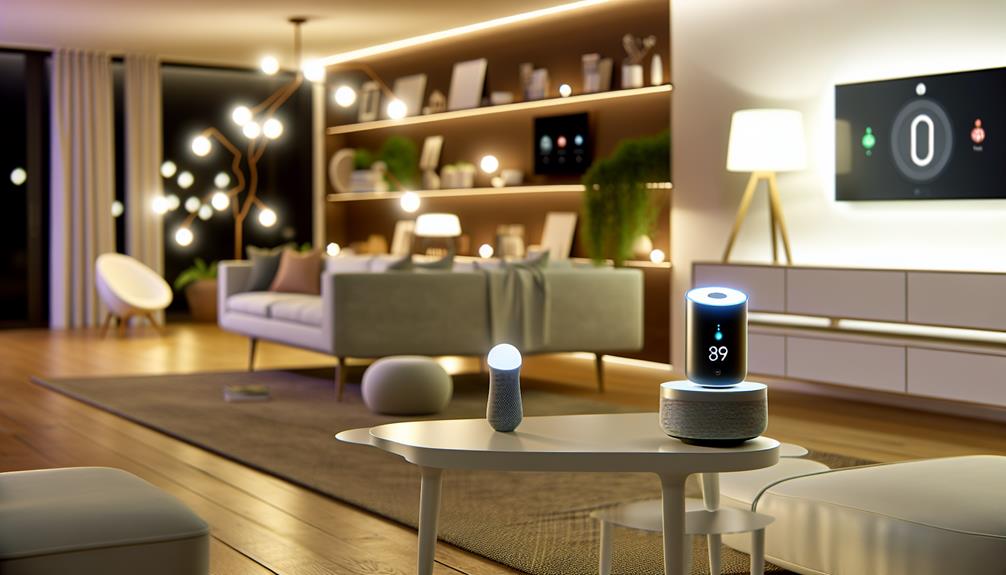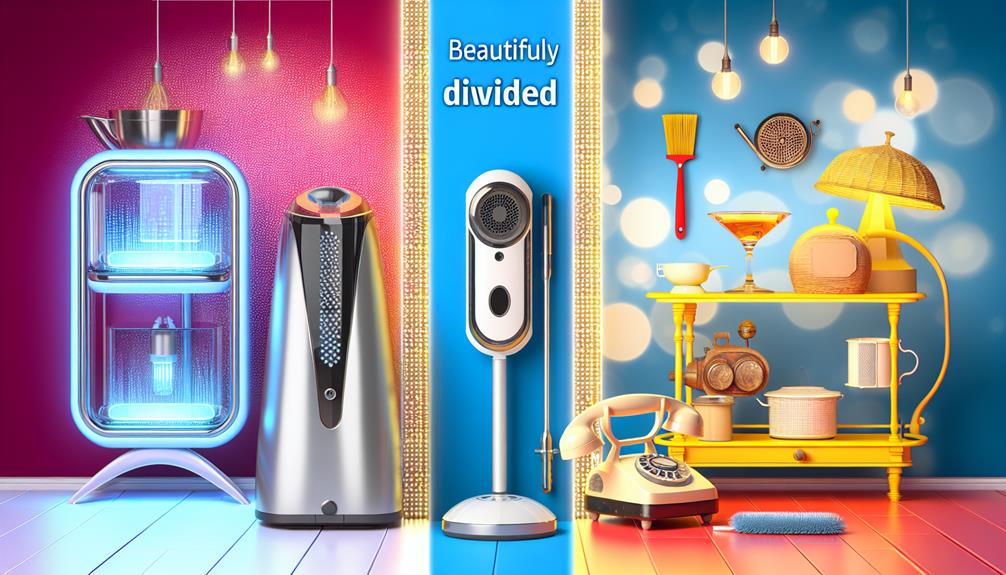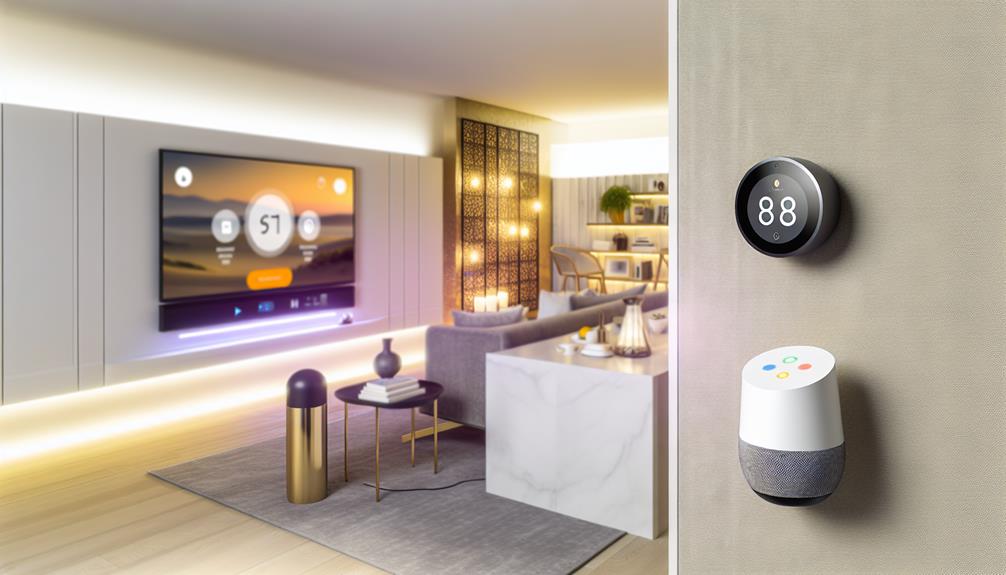Unveiling 2024’s AI Smart Home Innovations
As we approach 2024, the landscape of AI smart home innovations is set to transform notably, focusing on enhancing security, energy efficiency, and overall user experience. Key advancements, such as refined facial recognition technologies and sophisticated energy management systems, promise to redefine how we interact with our living environments. Furthermore, the evolution of voice-activated assistants raises pertinent questions about privacy and ethical considerations. Each of these developments hints at a future where our homes are not only smarter but also more attuned to our individual needs, inviting further exploration into the implications of these technologies.
Key takeaways
- Advanced AI-powered home security systems utilize facial recognition to enhance threat detection and minimize false alarms.
- Smart energy management solutions feature predictive analytics and renewable energy integration for optimized energy consumption.
- Voice-activated home assistants improve natural language understanding while addressing user privacy concerns.
- Automated cleaning devices like robotic vacuums and self-cleaning ovens prioritize efficiency and ease of maintenance for homeowners.
- AI-enhanced home entertainment systems personalize experiences and foster community through interactive gaming platforms.
AI-Powered Home Security Systems
In today's world, where safety is a paramount concern for homeowners, AI-powered home security systems are revolutionizing the way we protect our living spaces. These advanced systems integrate cutting-edge technologies, such as facial recognition and intrusion detection, to create a thorough security solution that offers peace of mind to families.
Facial recognition technology is a game-changer in the domain of home security. By analyzing video feeds in real-time, these systems can distinguish between familiar faces and potential intruders, greatly reducing false alarms while ensuring prompt responses to genuine threats. This level of sophistication fosters a sense of belonging, as homeowners can feel secure knowing that their loved ones are protected from unwanted intrusion.
Moreover, AI-driven intrusion detection algorithms continuously learn and adapt to the unique patterns of each household, enhancing the system's effectiveness over time. By identifying unusual behavior or anomalies, these systems provide timely alerts that empower homeowners to take proactive measures.
As we embrace the future of smart home innovations, AI-powered home security systems not only safeguard our physical spaces but also reinforce our emotional well-being, creating a safe haven for families to thrive.
Smart Energy Management Solutions
As homeowners increasingly prioritize safety and efficiency, smart energy management solutions are emerging as essential components of the modern smart home ecosystem.
These innovations empower residents to optimize their energy consumption through advanced technologies like smart thermostats, which learn user habits and adjust settings for maximum comfort and efficiency.
Moreover, the integration of renewable energy sources is becoming more prevalent, allowing homeowners to harness solar or wind power while contributing to a sustainable future.
Demand response systems further enhance this capability by enabling users to adjust their energy usage during peak times, thereby alleviating strain on the grid.
Predictive analytics plays a vital role in these solutions, forecasting energy needs and optimizing usage patterns.
Coupled with energy storage systems, homeowners can store excess energy generated during peak production periods, ensuring availability when needed.
Efficiency monitoring tools provide real-time insights into energy consumption, allowing for informed decisions that promote both savings and sustainability.
Ultimately, smart energy management solutions not only enhance individual comfort and savings but also foster a sense of community responsibility, aligning personal choices with broader environmental goals.
Voice-Activated Home Assistants
Transforming the way we interact with our living spaces, voice-activated home assistants have become a cornerstone of smart home technology. With significant voice recognition advancements, these devices are now more adept at understanding natural language, responding to commands with remarkable accuracy. This evolution not only enhances user experience but also fosters a sense of belonging as individuals can personalize their environments through simple voice interactions.
However, the rise of these innovative tools does not come without challenges. User privacy concerns have emerged as a prominent issue, with many individuals questioning how their data is collected and utilized. As homes become increasingly interconnected, the need for robust security measures becomes essential.
Manufacturers are making strides in addressing these concerns, offering transparency and control over personal information.
Ultimately, as we embrace the convenience of voice-activated home assistants, it is vital to balance technological advancement with ethical considerations. The future of smart homes lies in creating a safe, intuitive environment where users feel empowered and secure in their interactions.
As we look to 2024 and beyond, the dialogue surrounding these devices will continue to evolve, shaping the smart home landscape for years to come.
Automated Cleaning and Maintenance Devices
Efficiency embodies the essence of automated cleaning and maintenance devices, which have rapidly gained traction in modern households. The integration of advanced technology has led to the emergence of robotic vacuums and self-cleaning appliances, enhancing convenience and ensuring a cleaner living environment. These devices not only save time but also allow families to focus on what truly matters—spending quality moments together.
As we explore these innovations, it becomes pivotal to understand their features and advantages. Below is a summary of some popular automated cleaning devices:
| Device Type | Key Features | Benefits |
|---|---|---|
| Robotic Vacuums | Smart navigation, app control | Hands-free cleaning, customizable schedules |
| Self-Cleaning Ovens | Automatic cleaning cycles | Reduced maintenance effort, improved hygiene |
| Smart Dishwashers | Load sensing, energy-efficient | Time-saving, reduced water usage |
| Automatic Lawn Mowers | GPS navigation, weather sensors | Neat lawns, less manual effort |
With the rise of these technologies, families can embrace a lifestyle that prioritizes efficiency while fostering connection and belonging in the home. The future of household cleaning is certainly bright, paving the way for more innovations to come.
Enhanced Home Entertainment Experiences
The evolution of home entertainment systems has reached remarkable heights, driven by advancements in technology that enhance user experiences and accessibility. In 2024, the integration of artificial intelligence into smart home environments is revolutionizing how we engage with media, creating a more personalized and immersive experience.
One of the most significant innovations is the development of immersive audio systems that adapt to the acoustic properties of a room, delivering soundscapes that envelop users in their favorite films, music, and games. This technology not only elevates traditional viewing experiences but also fosters a deeper emotional connection to content, making it a centerpiece of social gatherings.
Additionally, interactive gaming has transformed into an all-encompassing experience, with AI-driven platforms that learn players' preferences and skill levels, offering tailored challenges and environments. This level of personalization encourages a sense of community among gamers, as they can easily connect and compete with others who share their interests.
As these technologies converge, the home entertainment experience becomes a crucial aspect of modern living, fostering belonging and connection in an increasingly digital world. Embracing these innovations means stepping into a future where entertainment is not just consumed, but truly experienced.
Frequently Asked Questions
How Do AI Innovations Impact Home Insurance Premiums in 2024?
AI innovations enhance risk assessment and streamline claims processing, leading to more accurate premium calculations. As home insurance adapts to these advancements, policyholders may experience reduced costs associated with lower perceived risks and faster service.
What Are the Privacy Concerns With AI Smart Home Devices?
"Curiosity killed the cat," highlighting the risks of AI smart home devices. Privacy concerns arise from inadequate data security and ambiguous user consent, potentially exposing personal information and undermining trust in technology's role in our lives.
Can AI Systems Integrate With Older Home Technology?
AI systems can indeed integrate with older home technology; however, legacy integration often faces compatibility challenges. Addressing these issues requires thoughtful consideration of both technological capabilities and user needs, fostering a cohesive and inclusive smart home environment.
What Are the Costs Associated With Installing AI Smart Home Innovations?
The costs associated with installing AI smart home innovations typically include installation expenses and ongoing maintenance fees. Budget considerations should encompass both initial outlay and potential upgrades, ensuring a thorough understanding of long-term financial commitments.
How Do AI Smart Homes Affect Property Resale Value?
AI smart homes are revolutionizing the resale market, catapulting property values to unprecedented heights. Embracing smart home trends not only enhances living experiences but also greatly boosts desirability, ensuring sellers attract premium offers in a competitive landscape.



